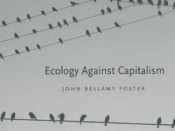“Imperialism and ‘Empire,” Monthly Review, vol. 53, no. 7, pp. 1-9. (December, 2001) DOI: 10.14452/MR-053-07-2001-11_1
Only a little more than a month ago at this writing, before September 11, the mass revolt against capitalist globalization that began in Seattle in November 1999 and that was still gathering force as recently as Genoa in July 2001 was exposing the contradictions of the system in a way not seen for many years. Yet the peculiar nature of this revolt was such that the concept of imperialism had been all but effaced, even within the left, by the concept of globalization, suggesting that some of the worst forms of international exploitation and rivalry had somehow abated.
Translations:
- Turkish translation in Cosmo Politik, no. 5 (Summer 2002), pp. 26-32
- Russian translation (2004) at http://www.left.ru/2004/10/foster109.html.
- Greek translation in Dramatically vol. 43 (2003) http://www.ardin.gr/taxonomy/term/735
- Spanish translation in Observatorio Social de América Latina (Argentina), no. 8 (September 2002). Translation by Florencia Enghel.

